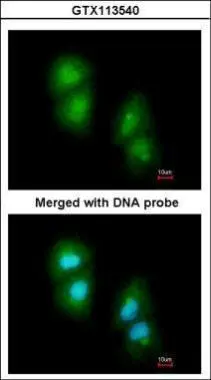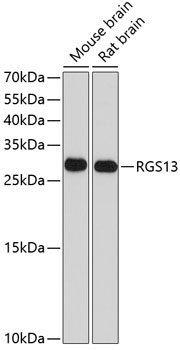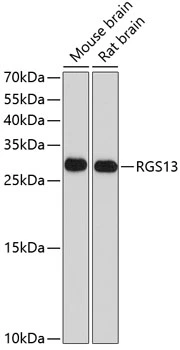![Various whole cell extracts (30 μg) were separated by 15% SDS-PAGE, and the membrane was blotted with RGS13 antibody [N1C3] (GTX113540) diluted at 1:1000. Various whole cell extracts (30 μg) were separated by 15% SDS-PAGE, and the membrane was blotted with RGS13 antibody [N1C3] (GTX113540) diluted at 1:1000.](https://www.genetex.com/upload/website/prouct_img/normal/GTX113540/GTX113540_40121_20160317_WB_w_23060501_254.webp)
Various whole cell extracts (30 μg) were separated by 15% SDS-PAGE, and the membrane was blotted with RGS13 antibody [N1C3] (GTX113540) diluted at 1:1000.
RGS13 antibody [N1C3]
GTX113540
ApplicationsImmunoFluorescence, Western Blot, ImmunoCytoChemistry, ImmunoHistoChemistry, ImmunoHistoChemistry Frozen
Product group Antibodies
ReactivityHuman, Mouse
TargetRGS13
Overview
- SupplierGeneTex
- Product NameRGS13 antibody [N1C3]
- Delivery Days Customer9
- Application Supplier NoteWB: 1:500-1:3000. ICC/IF: 1:100-1:1000. *Optimal dilutions/concentrations should be determined by the researcher.Not tested in other applications.
- ApplicationsImmunoFluorescence, Western Blot, ImmunoCytoChemistry, ImmunoHistoChemistry, ImmunoHistoChemistry Frozen
- CertificationResearch Use Only
- ClonalityPolyclonal
- Concentration1 mg/ml
- ConjugateUnconjugated
- Gene ID6003
- Target nameRGS13
- Target descriptionregulator of G protein signaling 13
- Target synonymsregulator of G-protein signaling 13, regulator of G-protein signalling 13
- HostRabbit
- IsotypeIgG
- Protein IDO14921
- Protein NameRegulator of G-protein signaling 13
- Scientific DescriptionThe protein encoded by this gene is a member of the regulator of G protein signaling (RGS) family. RGS family members share similarity with S. cerevisiae SST2 and C. elegans egl-10 proteins, which contain a characteristic conserved RGS domain. RGS proteins accelerate GTPase activity of G protein alpha-subunits, thereby driving G protein into their inactive GDP-bound form, thus negatively regulating G protein signaling. RGS proteins have been implicated in the fine tuning of a variety of cellular events in response to G protein-coupled receptor activation. The biological function of this gene, however, is unknown. Two transcript variants encoding the same isoform exist. [provided by RefSeq]
- ReactivityHuman, Mouse
- Storage Instruction-20°C or -80°C,2°C to 8°C
- UNSPSC41116161

![Non-transfected (–) and transfected (+) 293T whole cell extracts (30 μg) were separated by 15% SDS-PAGE, and the membrane was blotted with RGS13 antibody [N1C3] (GTX113540) diluted at 1:1000. The signal was developed with Trident ECL plus-Enhanced. Non-transfected (–) and transfected (+) 293T whole cell extracts (30 μg) were separated by 15% SDS-PAGE, and the membrane was blotted with RGS13 antibody [N1C3] (GTX113540) diluted at 1:1000. The signal was developed with Trident ECL plus-Enhanced.](https://www.genetex.com/upload/website/prouct_img/normal/GTX113540/GTX113540_40121_20160317_WB_B_w_23060501_284.webp)







